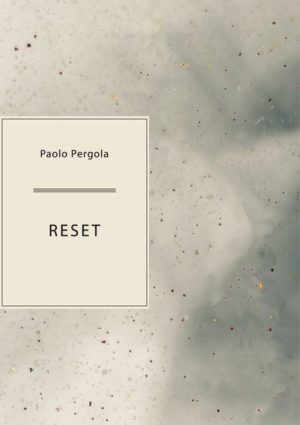You have no items in your cart. Want to get some nice things?
Go shopping
By the beginning of Paolo Pergola’s Reset, the central action of the story has already taken place. The narrator, finding himself stranded in a hospital bed some time after the fact, does little more than remain in the aforementioned bed for the duration of the novel, or rather, for as long as he possibly can before being forced to leave by the reality of his recovery. He was the victim of a car accident, a struck-down pedestrian. By his convalescent bedside, he keeps two books with him at all times, which he reads and rereads intermittently: Ivan Goncharov’s 1859 novel Oblomov, the story of a man who rarely departs from his bed, let alone the bedroom itself; and Georges Perec’s 1967 work Un Homme qui Dort (A Man Asleep), a tale told in the intimate second-person Tu of a student who turns away from the world in indifference. From these two references, it should be clear the direction of Pergola’s concept and the emotional register of his writing.
Not coincidentally, Paolo Pergola is a member of Opificio Letteratura Potenziale, or OPLEPO, the Italian equivalent of France’s Ouvroir de Littérature Potentielle, or OULIPO, of which Georges Perec was a pioneering and prominent member. The intentions of Paolo Pergola, then, seem to be to write a story in which the protagonist’s actions are made entirely in the negative: He negates his active existence, he abdicates the throne of life. Everything he does he does instead of doing something else. Not only this, but Pergola himself negates his own native Italian, writing the book instead in English. His narrator’s decisions are made as substitutes in place of (in a conventional and day-to-day sense) actually existing. In a pseudo-Platonic way, his narrator’s life becomes one of metaphysical contemplation, and a parody of the act itself:
People do talk about sleeping. but in the sense of dreaming, my dream is this or that. But sleeping per se, is not talked about much, for example in books. Nobody talks about sleeping in the sense of reaching the basal metabolic rate, I mean, taking into account only the essential energy expenses necessary for staying alive. On the other hand, when you wake up, you are active, your metabolism increases, so you have to eat, and if you eat, you digest, and your digestion increases your metabolism even more, so you can’t take it anymore and that’s why you get sleepy after a good meal. So, you might as well stay in bed.
He might follow Schopenhauer as he turns away from the world’s cruelties and banalities. He might follow Diogenes as he defers the responsibilities of everyday life to be aloof and exempt from the world. But he is neither a philosopher nor a cynic. Neither is he a monk, as most of his contemplations are strictly material and worldly, and many of them are remembrances of a past sometimes as mundane as the present he intends to avoid. Schooldays come back to him, replete with first crushes, bullies, and classroom humiliations, doubling back into the present time, where he tries to anticipate their relevance to his life and their reappearance:
As a young boy I dreamed that I would become a movie director when I was grown up. It must have happened in middle school, that is, a few years after not having saved Caterina Magri, when I came up with this idea. I dreamed of becoming a movie director, of becoming quite famous, and then shooting the movie I had always dreamed of, a movie filmed and produced by myself. I would have called this self-produced and self-filmed movie “Closed Today”. I remember that it didn’t matter what the movie was going to be about, I mean, it could have been a western with fistfights and pistols, a kind of remake of Sergio Leone’s films and it would have been just fine. It could also have been a comedy, a thriller, or even a thriller comedy, that would have been alright. The important thing was not the content, but the title: “Closed Today”.
From his hospital bed, this narrator, Lapo (a marine biologist and experienced traveller-hitchhiker, making him almost interchangeable with Pergola himself) muses on multifarious potential concepts, endeavours and projects, most of them ways to trick and expose. For instance, his film Closed Today would cause the accidental mass-closure of cinemas. Following this, another project is to create a novel that doesn’t exist, in the sense that it cannot be found and thus cannot be bought:
You go to a bookstore, you look for a book, then you go to the counter and say I don’t remember the title, what was it? In Search of a Title, something like that, but I do remember the author, it’s so-and-so. The bookseller looks it up on her computer, and all she gets is No Title Found. I’m sorry, sir, but there is no title by that author. Out of curiosity, I also checked on my computer to see what comes up if one looks for No Title Found, on that bookstore website. If you look for No Title Found, you get No Title Found.
As a result, after some time the book begins to resemble a reliquary of ideas, all of which are paths-not-taken, though they might run parallel to the book. This is frustrating but also amusing and lightens the pretensions that “experimental Oulipian literature” might bring as a form of writing. Instead, the avant-garde is clothed in kid’s-wear. His niece proposes a new way of storytelling (reductio ad purissimum sensum), where all elements of speech can be reduced to a few Nabokovian keywords:
And for any sentences, two keywords are enough, two keywords say it all, you’ll see, she tells me. Tell me a sentence, so that I can show you how it works, Uncle Lapo. Okay, here it is, today Dr. Braglia came to visit us, then you came with your grandmother. And she goes doctor, grandmother. So I tell her, yesterday Rome won one to zero, and she goes Rome, won. What if I tell you something more complicated? I ask her, like some songs? Try it, uncle Lapo, she replies. At the Oriental fair my father bought a mouse, I tell her. And she goes, fair, mouse. And if I tell you Rome, don’t be silly tonight? Rome, silly, she says.
And so nothing happens and nothing continues to happen, until eventually it does, and the narrator begins to realise that to opt-out of living is to opt-out of personal choice. Life is lived on his behalf, and unsurprisingly, takes some less-than-optimal turns. The book is in this way an anti-novel, in which the character is a non-character whose life takes place in the background of the lives of others: a walk-on part, an extra, an NPC. The tone is light and mischievous, but this airiness soon gives way to an expanding sense of melancholy. The cosy feeling of being exempt from being, of being taken care of, of being a patient (unique for being marked as an invalid; neutral for being a nonentity) transitions into the feeling of being excluded, of being expected to act, of being misunderstood and left out.
The narrator dabbles in conventional pastimes: mass-market literature, videogames, et cetera. These minor social and personal pleasures of contemporary life soon begin to seem equal and identical to its banalities. Facebook, Nintendo, Eat Pray Love. As exercises in passing the time, they easily achieve their objective, and no more. Pointless as they seem, they are made to equate with the position the narrator finds himself in: His vegetation is the logic of an expected “normal” life, taken to its point of illogical conclusion. The demand to be productive, to progress, to advance in self-fulfilment, in career, in experience, in marriage, is a form of constant movement, which from a certain angle, resembles a total stasis: a neutralis.
The question of whether it can be considered responsible or reasonable for a person to simply stop living and shirk all responsibility isn’t exactly underlined in the narrative arc. Implicit, instead, is the self-defeat of a man, brought on by an accident. What the book does succeed in is the arduous goal of keeping the attention of the reader throughout a process specifically engineered for nothing (or as close to nothing as possible) to happen. This isn’t an easy task, and this novel-of-peculiarity actually becomes increasingly depressing in an alarmingly predictable order (break bones, lose friends, lose wife, leave country). Nonetheless, this is all carried off with Pergola’s comedic sense of the absurd, his toilet humour, his infantility, his regressions, until it sometimes seems he has acquiesced into the same mundanity his narrator wants to escape. For a novel so ostensibly light, it leaves the impression of a freedom won but at the expense of a sparse, sprawling hopelessness. This, of course, is its broadest success.
Reset
By Paolo Pergola
Sagging Meniscus Press, 144 pages
joshua calladine-jones
Joshua Calladine-Jones is a writer and the literary-critic-in-residence at Prague Writers' Festival. His work has appeared or is forthcoming in 3:AM, The Stinging Fly, Freedom, The Anarchist Library, and Literární.cz. His short collection Constructions is to be published by tall-lighthouse in 2021.




